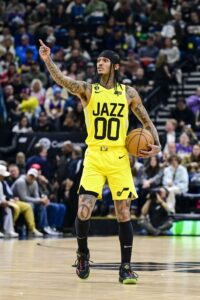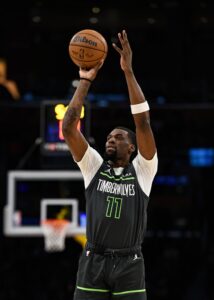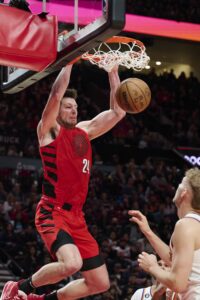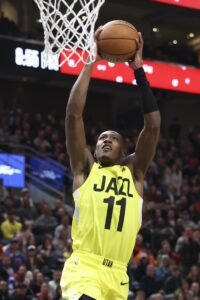We still have nearly five weeks left in the NBA’s regular season, and play-in results, tiebreakers, and the draft lottery will further clarify what this year’s draft order will look like.
However, as the season enters its home stretch, we’re starting to get a clearer sense of which traded 2023 first-round picks will actually change hands (as opposed to falling in their protected range) and where those first-rounders will land. Here’s where things stand right now:
Picks that will be protected
- Pistons‘ pick (top-18 protected) to Knicks
- Hornets‘ pick (top-16 protected) to Spurs
The Pistons and Hornets are currently the bottom two teams in the Eastern Conference and appear unlikely to move any higher in the standings. There’s obviously no chance that they’ll end up picking the back half of the first round, so they’ll hang onto their first-round picks for at least one more year.
Once both of those picks are officially protected, the Pistons will owe the Knicks their 2024 first-rounder with top-18 protection, while the Hornets will owe the Spurs their 2024 first-rounder with top-14 protection.
Picks on track to change hands
- Sixers‘ and Nets‘ picks (unprotected) to Nets and Jazz.
- Bucks‘ and Clippers‘ picks (unprotected) to Clippers and Rockets.
- Mavericks‘ pick (top-10 protected) to Knicks
- Timberwolves‘ pick (unprotected) to Jazz.
- Suns‘ pick (unprotected) to Nets.
- Knicks‘ pick (top-14 protected) to Trail Blazers.
- Cavaliers‘ pick (top-14 protected) to Pacers.
- Celtics‘ pick (top-12 protected) to Pacers.
- Nuggets‘ pick (top-14 protected) to Hornets.
Let’s work backwards and start with the obvious here. The Nuggets currently have the NBA’s second-best record, which would result in the No. 29 pick. The Celtics’ third-best record would give them the No. 28 pick. So Charlotte and Indiana, respectively, will definitely get those picks, but they’ll be pretty late in the first round.
Given the unpredictability that the play-in possibility injects into the playoff race, it may be a little early to lock in the Cavaliers and Knicks as automatic playoff teams, but they’re certainly trending in that direction. If the season ended today, Indiana would get the No. 26 overall pick from Cleveland and Portland would get the No. 23 selection from New York.
The Timberwolves’ and Suns’ picks have no protections, so they’re definitely changing hands — the only question is where they’ll land. Right now, Phoenix’s No. 21 pick would go to Brooklyn and Minnesota’s No. 18 pick would go to Utah.
The fact that the Mavericks’ pick is top-10 protected instead of lottery-protected means it could convey to the Knicks even if Dallas doesn’t earn a playoff spot. Right now, the Mavs are the seventh seed in the West and would owe the No. 17 seed to New York, but the playoff race is so tight and the play-in has such potential for fluctuation that Dallas’ pick could move a few spots in either direction.
The Nets will have the right to either their own pick or the Sixers’ pick, whichever is more favorable, with Utah receiving the less favorable of the two. Right now, that means Brooklyn would hang onto its own first-rounder (No. 22) while the Jazz would get Philadelphia’s pick (No. 27).
The Rockets won’t get to take advantage of their ability to swap their own pick for Brooklyn’s, but they have a second set of swap rights that should come in handy — Houston has the ability to swap Milwaukee’s first-rounder for the Clippers’ pick, with L.A. getting the less favorable of the two. That means if the season ended today, the Rockets would be in line for the Clippers’ first-rounder at No. 16, while L.A. would get the Bucks’ pick and move down 14 spots to No. 30.
One caveat here: If the Clippers’ first-round pick happens to land ahead of the Thunder’s pick, Oklahoma City would be able to swap its own pick for L.A.’s, then Houston could swap the Bucks’ first-rounder for OKC’s pick. For now though, that looks like a long shot, with the Clippers far better positioned than the Thunder in the Western playoff race.
Picks that remain the most up in the air
- Bulls‘ pick (top-4 protected) to Magic
- Wizards‘ pick (top-14 protected) to Knicks
- Trail Blazers‘ pick (top-14 protected) to Bulls
- Lakers‘ pick (unprotected) to Pelicans via swap rights
If the season ended today, the Bulls would be seventh in the draft lottery standings. That would give them a 31.9% chance to move up into the top four, meaning their pick would have about a two-in-three chance to go to Orlando. The Magic’s odds of acquiring the pick will increase if Chicago finishes the season strong.
If the Bulls manage to hang onto their pick this year, they’d owe the Magic their top-three protected first-rounder in 2024.
The Wizards are 10th in the East and have a decent chance to secure a play-in berth, but their odds of capturing a playoff spot are longer. If they lose in the play-in (or miss it entirely), they’ll keep their first-rounder rather than sending it to the Knicks, and would instead owe New York their top-12 protected pick in 2024.
The Trail Blazers are in a similar boat in the West, still in the play-in hunt but with increasingly long odds to actually make the playoffs. If they don’t get a first-round series in the postseason, they’ll hang onto their pick rather than sending it to the Bulls. Chicago will have to wait until Portland makes the playoffs to get that first-round selection, which remains lottery-protected through 2028.
Meanwhile, the Pelicans’ ability to swap first-rounders with the Lakers has been one of the most fascinating draft assets to monitor this year.
At one point in the first half, with Los Angeles off to an awful start and the Pelicans firing on all cylinders, it looked like New Orleans would be able to use that swap to move from the 20s into the top 10. Today, both teams have identical 31-34 records and have been trending in opposite directions. If that trend continues, New Orleans will end up keeping its own pick rather than swapping it for the Lakers’ first-rounder.
 Clarkson is expected to decline his player option to land a long-term contract in free agency, which makes a lot of sense. He’s averaging career highs in points (20.8) and assists (4.4) per game and has matched his career best in rebounds per night (4.0) while posting a .444/.338/.816 shooting slash line (.558 true shooting percentage).
Clarkson is expected to decline his player option to land a long-term contract in free agency, which makes a lot of sense. He’s averaging career highs in points (20.8) and assists (4.4) per game and has matched his career best in rebounds per night (4.0) while posting a .444/.338/.816 shooting slash line (.558 true shooting percentage). Reid’s per 36 numbers have been quite consistent in each of his four seasons. So why is his stock up?
Reid’s per 36 numbers have been quite consistent in each of his four seasons. So why is his stock up? Another player on a minimum-salary deal, Eubanks plays within a clearly defined, limited offensive role of setting hard screens, rolling for the occasional lob, and crashing the offensive glass. His averages of 6.1 points, 5.1 rebounds and 1.2 blocks don’t exactly jump off the page, though he is shooting an impressive 68.3% from the field through 62 games (19 starts, 19.9 minutes).
Another player on a minimum-salary deal, Eubanks plays within a clearly defined, limited offensive role of setting hard screens, rolling for the occasional lob, and crashing the offensive glass. His averages of 6.1 points, 5.1 rebounds and 1.2 blocks don’t exactly jump off the page, though he is shooting an impressive 68.3% from the field through 62 games (19 starts, 19.9 minutes). 7:09am:
7:09am: